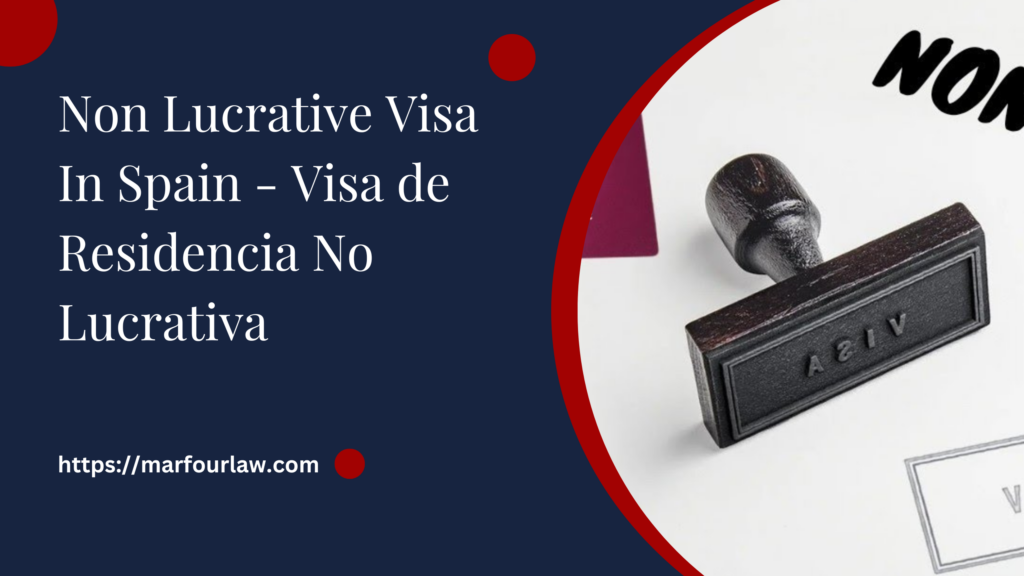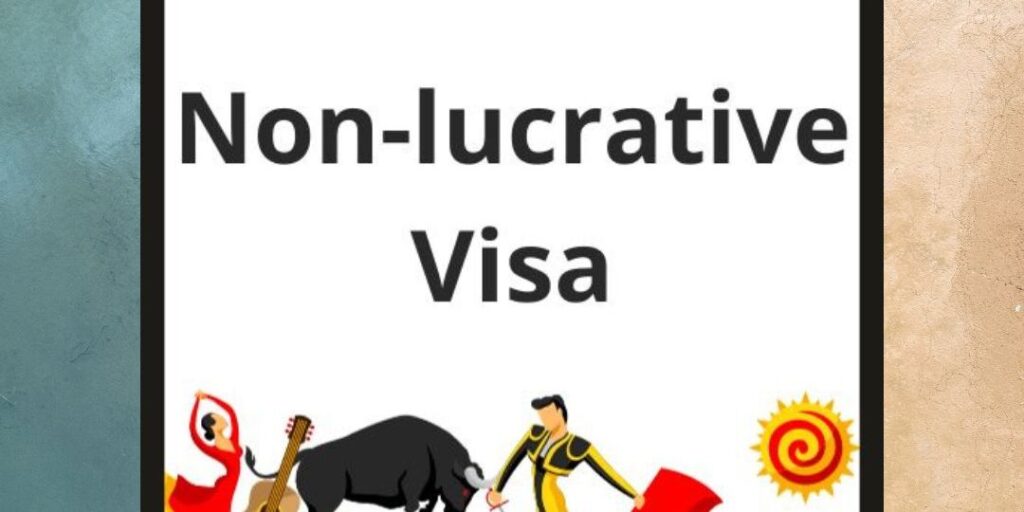Non Lucrative Visa In Spain
Yes! If you are financially well-off. The nonlucrative visa allows you to live in Spain for an initial period, typically ranging from several months to a year, with the possibility of renewal.
Non lucrative Visa In Spain: Visa de Residencia No Lucrativa

Non Lucrative Visa In Spain: Unlike work visas or business visas, the Non Lucrative Visa does not allow you to do any business in Spain. Instead, it is specifically for you if you have the financial means to live in Spain without working.
We shall make it easy for you to get a Non Lucrative Visa in Spain by providing detailed guidelines in this article. So, if you are interested in obtaining this visa, keep reading!
Who is eligible for a Non Lucrative Visa in Spain?
The Non Lucrative Visa is the most requested visa in Spain, but not everyone is eligible for it. Here are the conditions to qualify for this visa:
- You are not planning to carry out any work or professional activity in Spain.
- You have sufficient financial means to sustain your life in Spain.
- You have a clean criminal record and have never been a part of any criminal activity.
- You obtain private health insurance with coverage in Spain. The insurance should cover all medical expenses and provide full coverage for the duration of your stay.
- You are medically fit. A medical certificate is required stating that you do not suffer from any contagious diseases that could pose a public health threat in Spain.
- You have a place to live in Spain during your stay. This could be a rental agreement or proof of property ownership.
What Are The benefits of a Non Lucrative visa?
The Non Lucrative Visa (Visa de Residencia Temporal No Lucrativa) in Spain offers several benefits for individuals who wish to reside in the country without undertaking any work or professional action.
You can enjoy staying in Spain for an extended period.
The Non Lucrative Visa allows you to stay in Spain for an extended period, typically for one year initially. This can be renewed for up to two years after that as long as the eligibility criteria are met.

Non Lucrative visas in Spain include free travel to all European countries.
With the Non Lucrative Visa, you can travel freely within the Schengen Area, which includes most European Union countries.
This allows for easy exploration and travel within Europe during the visa’s validity period.
Access to Healthcare for a complete stay.
To obtain the Non Lucrative Visa, applicants must have private health insurance coverage in Spain.
The Non Lucrative Visa allows for family reunification, meaning that the spouse and dependent children can also apply for visas to accompany the primary visa holder in Spain.
It provides a Path to Residency and Spanish citizenship.
After residing in Spain for a certain number of years under the Nonlucrative Visa (usually five continuous years), you may become eligible to apply for long-term residency or even Spanish citizenship ( between 2 years and 10years), provided you meet the residency requirements.
Your children can have access to the Spanish education system.
If applicable, dependent children accompanying the visa holder may have access to Spain’s education system.
What are the requirements of a Non Lucrative visa?
Justify enough savings or regular incomes for your stay.
As this visa does not permit employment within the country, you have to prove you have sufficient money to sustain.
- Ensuring you have the means to support your expenses is a crucial requirement to prevent reliance on government assistance. You have to prove you are financially well off.
- To determine if you meet the minimum financial requirement, we refer to the IPREM, an indicator used to establish the minimum yearly income needed for various subsidies in the country.
- This means having the necessary economic resources to sustain yourself will be a primary condition for obtaining this residency authorization.
The minimum funds required to obtain this residence permit.
For the Non Lucrative Visa, applicants are required to demonstrate they have 400% of the IPREM annually in their bank account. In 2023, the IPREM stands at €8.400 for the year.
Therefore, the principal applicant must prove they have €33.600 available. It’s advisable to have a bit more than this minimum amount for a successful application.
This figure should be seen as the baseline requirement. It’s important to note that the minimum amount may vary depending on the consulate you apply through, such as Washington or Moscow, where the requirement could be higher.
Consulting with legal experts is recommended for precise details according to your country of origin.
Demonstrating that you possess the required amount can be done in various ways.
According to Spanish immigration law, any form of proof is acceptable. However, it is common for Spanish consulates to request a bank certificate showing liquid funds in your account.
This certificate should be dated as close to the application day as possible.
Alternatively, you can use property income as proof, provided you also submit a document from your bank certifying their validity.
Please note that specific requirements may vary depending on the consulate. Often, the administration will review bank statements from the last six months.
Furthermore, the funds must be in the name or on behalf of the main visa applicant.
The necessary funds and process to include your family members in the application.
When you apply, you can also include in your application your spouse and children under the legal age (or over if you can demonstrate you are their caregiver).
If you choose to apply jointly to bring your family members, the minimum amount of funds you must demonstrate increases. For each accompanying family member, you need to show an additional 100% of the IPREM, which amounts to an extra €8,400 annually.
Application Procedure: How to Obtain a Spanish Non Lucrative Visa?
The application process for this visa is straightforward and divided into two main parts: the initial visa application in your country of origin and obtaining the residence card upon arrival in Spain.

Visa Application:
To apply for this residence authorization, you must begin the process in your country of origin or the place where you hold legal residency.
Applying while in Spain on a tourist visa is not permissible; the process must commence from outside the country.
The first step is to submit all required documents to the Spanish Consulate (the necessary documents are listed in the following section).
The government authority responsible for processing the applications will have one month to provide a response. Failure to receive a response within this period will result in the request being denied due to “administrative silence.”
Upon receiving a favorable response, the visa will be stamped in your passport, allowing you to proceed to the next stage: traveling to Spain.
Obtaining the TIE (Foreigner’s Identity Card):
Once you have your visa, you can freely enter Spain, but it must be done within a maximum of 3 months from getting the visa.
In this case, you won’t need to separately obtain the NIE number upon arrival in Spain, as it will already be included in your visa.
After arriving in Spain, your first task will be registering with the municipality where you reside. Within a maximum of 1 month, you must visit a police station, register your fingerprints, and receive the TIE or Foreigner’s Identity Card.
That’s all there is to it. You will be able to enter the country and receive your residence permit within 40 days without any further steps required.
From the day your visa is stamped in your passport, you will already be considered a legal resident in the country, with the clock starting for your path towards citizenship.
Required Documents
Here are the documents required for the Non Lucrative Residency Visa:
- National visa form.
- Form Ex.
- Insurance: The insurance must be from a Spanish company, not an international one, and it must be private.
- Bank certificate demonstrating possession of over €33,600 per year.
- Photos (3×4 cm) with a white background.
- Original Passport.
- Medical certificate confirming you do not suffer from any recognized diseases that would prevent entry into the country.
- Criminal records are correctly translated and legalized.
Common Reasons for Denial and Solutions:
It is not uncommon for Non Lucrative Visa applications to be denied.
The main reasons often include insufficient financial means, as requirements can vary by consulate, sometimes requiring double the legally established amount.
Failing to meet any of the explained requirements in this article can also lead to denial.
In case of denial, it is advisable to seek legal assistance to ensure a secure path to obtain your residence permit.
An immigration lawyer at Marfour Law Firm can help you with an appeal or court process to argue that the application was wrongly rejected and secure the visa.
In certain circumstances, the application may be resubmitted without legal intervention.
At Marfour Law Firm, we can assist you in addressing any issues that arise during the application process.
Transitioning from a Non Lucrative Visa to a Work Permit
As discussed earlier, transitioning to a work permit through a residence modification is an option available to Non Lucrative Visa holders.
This is an ideal path for you if you have spent a year in Spain with sufficient savings but now wish to start working again to support your daily expenses.
In this scenario, you can use the final months of your Non Lucrative Visa period to search for employment in the country.
Once you secure a job, the process for your employer becomes straightforward. Since you already have residency authorization, they simply need to apply for a work permit on your behalf.
This work permit will grant you authorization to live and work in Spain for another year.
Alternatively, you can also transition to a work permit as a self-employed individual, becoming an “autónomo” in the country. This allows you to work for yourself rather than for an employer.
Tax Obligations with the Non Lucrative Residence Visa
Let’s discuss the taxes that you will need to consider when holding the Non Lucrative Residence Visa in Spain.
Tax Residency:
Since this visa requires a minimum stay of 183 days per year in Spain for renewal, you will become a tax resident.
This means that you will be subject to income tax on your worldwide income. However, there are double taxation agreements in place.
These agreements ensure that you do not pay tax twice on the same income, especially if it was earned in another country but also taxed in Spain.
Capital Gains Tax
If you choose to invest, such as in company shares, and you earn a profit from these investments, you will be liable to pay capital gains tax.
Property Transactions
In the event of purchasing property, there may also be taxes associated with the transaction that you need to consider.
FAQs
Here are some important FAQs:

Question and Answer
1: What is the Non Lucrative Visa in Spain?
The Non Lucrative Visa is a residence permit allowing individuals to live in Spain without engaging in any work or professional activities. It is ideal for retirees, financially independent individuals, and those seeking to reside in Spain for personal reasons.
2: How long is the initial duration of the Non Lucrative Visa?
The initial duration of the Non Lucrative Visa is usually one year. It can be renewed annually, provided the applicant meets the visa requirements.
3: Can I work with the Non Lucrative Visa?
No, the Non Lucrative Visa does not allow for any work or professional activities in Spain. It is strictly for individuals who can support themselves financially without the need for employment.
4: What are the financial requirements for the Non Lucrative Visa?
Applicants must demonstrate that they have sufficient financial means to support themselves during their stay in Spain. As of this year, the minimum required amount is €33,600 per year. This amount may vary based on the consulate and the number of accompanying family members.
Conclusion
Hence, the Non Lucrative Visa in Spain presents an opportunity for individuals seeking to reside in the country for personal reasons, such as retirement, family reunification, or a change of scenery.
This visa offers a straightforward pathway to Spanish residency without the requirement of engaging in work or professional activities.
With the obligation of demonstrating sufficient financial means and securing private health insurance, applicants can enjoy the rich culture.
Furthermore, the option to transition to a work permit through a residence modification opens a pathway for you if you are seeking employment opportunities after fulfilling the initial visa requirements.
Whenever you find any difficulty, feel free to contact us. We are definitely here for you!
If you are from a non-EU country and want to live in Spain, you will need to get a residence permit. But how do you do it? How exactly can you get your visa or permit?
Thanks to our team of English-speaking immigration lawyers in Madrid and Barcelona, we have extensive knowledge of the performance and specialties of each Spanish Consulate in the following countries: USA, UK, Australia, India, Morocco, Turkey, Philippines, Canada, UAE, Kuwait, Saudi Arabia, South Africa, Lebanon, Mexico, Colombia, Ecuador, and China.
The Spanish Non Lucrative Visa has become one of the easiest and most requested visas worldwide to settle in Spain. Consequently, at Marfour International Law Firm, you can find the best team of immigration lawyers proficient in both English and Spanish, specialized in the Spanish Non Lucrative Visa.
obtained Non Lucrative visas
assisted Clients
%
satisfied clients
How can I get a Non Lucrative Visa in Spain?
The legal process for the Non Lucrative Visa in Spain is divided into two stages.
The first stage is to get the long-term visa from the Spanish Consulate, since the process of getting the Non Lucrative Visa can only be started at the Spanish consulate in the applicant’s country of origin or place of legal residence.
Once the applicant gets the long-term visa from Spain, they will proceed with the second stage of the wealth visa. This consists in obtaining a residence certificate, called the Padron, and then the TIE, which is the foreigner’s residence card.
Your first Non Lucrative Visa in Spain will be valid for one year with the option to renew it for a total of two years.
Our immigration lawyers in Barcelona and Madrid will guide you through the whole process and assist you every step of the way.
What are the main requirements for the Non Lucrative Visa?
The applicant must have a private health insurance policy with an insurance company that operates in Spain.
The applicant and their family must not have any criminal record, although there are some exceptions (contact us for more information regarding this).
If the applicant is accompanied by minors (between 6 and 16 years of age), they will need to be enrolled at an education center in Spain.
I WANT TO APPLY FOR A NON LUCRATIVE VISA in Spain
- Tailored legal advice.
- Guidance on gathering the necessary documents.
- Arranging the meeting with the Spanish consulate.
- Direct contact with the Spanish consulate.
- Assistance with translating the documents into Spanish.
- Getting health insurance.
- Following the application until its resolution.
- Assisting with registration at the Spanish city council.
- Assisting with procedures at the police station in Spain.
- Preparing the corresponding forms and administration fee.

testimonials
MARFOUR IS READY TO HELP YOU WITH YOUR NON LUCRATIVE VISA
Thanks to our English-speaking immigration lawyers in Spain, we can offer the tailored legal advice you need for your Non Lucrative Visa. Marfour is your trusted English-speaking law firm in Spain. Please feel free to send us your inquiry.

